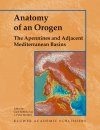![Anatomy of an Orogen: The Apennines and Adjacent Mediterranean Basins Anatomy of an Orogen: The Apennines and Adjacent Mediterranean Basins]()
Click to have a closer look
About this book
Contents
Customer reviews
Related titles
About this book
This is the first book in English reviewing and updating the geology of the whole Apennines, one of the recent most uplifted mountains in the world. The Apennines are the place from which Steno (1669) first stated the principles of geology. The Apennines also represent amongst others, the finding/testing sites of processes and products like volcanic eruptions, earthquakes, olistostromes and melanges (argille scagliose), salinity crisis, geothermal fluids, thrust-top basins, and turbidites (first represented in a famous Leonardo's painting). As such, the Apennines are a testing and learning ground readily accessible and rich of any type of field data.A growing literature is available most of which is not published in widely available journals. The objective of the book is to provide a synthesis of current data and ideas on the Apennines, for the most part simply written and suitable for an international audience. However, sufficient details and in-depth analyses of the various complex settings have been presented to make this material useful to professional scholars and to students of senior university courses.
Contents
Preface. List of contributors. 1. Geomorphologic setting G.B. Vai, I.P. Martini. 2. Summaries of the contributions and few considerations; G.B. Vai, I.P. Martini. 3. Structure and stratigraphy: an overview; G.B. Vai. 4. Deep structure from seismic tomography; A. Amato, G.B. Cimini. 5. Deep seismic transects; R. Nicolich. 6. Magnetic and gravity analysis of Italy; E. Cassano, et al. 7. Deep temperatures and surface heat flow distribution; B.D. Vedova, et al. 8. Magmatism from Mesozoic to Present: petrogenesis, time-space distribution and geodynamic implications; G. Serri, et al. 9. Volcanism in the Southern Apennines and Sicily; B. Behncke. 10. Basement and early (pre-Alpine) history; G.B. Vai. 11. Ophiolites, Ligurides and the tectonic evolution from spreading to convergence of a Mesozoic Western Tethys segment; V. Bortolotti, et al. 12. Disrupted and chaotic rock units; D.S. Cowan, A. Pini. 13. Alps -- Apennines and Po Plain -- frontal Apennines relationships; A. Castellarin. 14. Inner Northern Apennines; L. Carmignani, et al. 15. Outer Northern Apennines; M. Barchi, et al. 16. The Apenninic-Maghrebian orogen in southern Italy, Sicily and adjacent areas; M. Grasso. 17. Calabria-Peloritani terrane and northern Ionian Sea; G. Bonardi, et al. 18. Mesozoic-Tertiary carbonate platforms, slopes and basins of the external Apennines and Sicily; D. Bernoulli. 19. Tertiary silicoclastic turbidite systems of the Northern Apennines; A. Argnani, F.R. Lucchi. 20. Fluid venting and associated processes; M. Taviani. 21. Corsica-Sardinia block and the Tyrrhenian Sea; R. Sartori. 22. Neogene-Quaternary basins of the inner Apennines and Calabrian arc, Italy; I.P. Martini, et al. 23. Late thrust propagation and sedimentary response in the thrust belt-foredeep system of the Southern Apennines (Pliocene-Pleistocene); E. Patacca, P. Scandone. 24. Structural styles inferred by seismic profiles; S. Merlini, G. Cippitelli. 25. Late-Pleistocene and Holocene deposition along the coasts and continental shelves of the Italian peninsula; P. Tortora, et al. 26. Volcanic hazard; F. Barberi, M.L. Carapezza. 27. Seismogenic faulting, moment release patterns and seismic hazard along the central and southern Apennines and the Calabrian arc; G. Valensise, D. Pantosti. 28. Geo-hydrological hazard; P. Canuti, et al. 29. Italian petroleum geology; M. Pieri. References. General Index. List of Color maps.
Customer Reviews


































